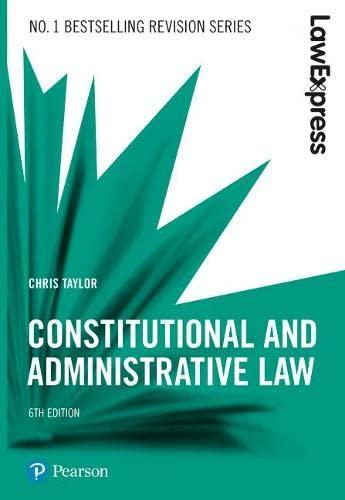Question
Ted Henry, trial court administrator of the Ticonderoga County, New York court system, has grown tired of all of the relatively trivial cases plaguing his
Ted Henry, trial court administrator of the Ticonderoga County, New York court system, has grown tired of all of the relatively trivial cases plaguing his county's court dockets.In Ted's opinion, everyone wants to exercise their "uniquely American" right to sue these days, even when the amount in controversy is comparatively trivial; in Ticonderoga County, for example, the number of cases valued at less than $10,000 has doubled in the past ten (10) years.Ted blames the increase in "low-value" litigation on our litigious culture.He firmly believes that after having watched an overabundance of legal melodramas on television, every American either wants to be a lawyer, or get a lawyer.
As a trial court administrator, Ted has been especially affected by the increase in litigation.Ticonderoga County's financial resources are limited, especially during difficult economic times.For Ted, it has become increasingly challenging for him to manage the trial court docket each week with only a limited number of judges, bailiffs, trial transcriptionists, and other key court personnel available.Ted knows that when it comes to the courtroom, time is definitely money, and local taxpayers have not exactly "warmed up" to the idea of hiring more judges and other court personnel to respond to the onslaught of increased litigation.
Ted has what he believes to be a "modest proposal."In Ticonderoga County, he would like to implement binding arbitration for each case involving an amount in controversy of less than $10,000 (In binding arbitration, the arbitrator's decision is final and non-appealable).As part of his proposal, the parties involved in the litigation (plaintiff and defendant) would pay for the expenses of arbitration, and select the arbitrator.In law school, Ted's first-year torts professor had told his class that there was no guarantee of justice in the courtroom, and based on his experience, Ted believed that his professor had been correct in that assessment; after all, there were too many contingencies and variables in the courtroom to guarantee justice, including the effectiveness of legal counsel, the proclivities of the judge presiding over the case, and the makeup of the jury.In Ted's view, who is to say that justice would not be better served in a case if a neutral, experienced arbitrator was involved in the dispute resolution, as opposed to a judge and jury in a traditional courtroom? Ted is excited about his proposal, since (if implemented) it would reduce dramatically the number of cases processed through the regular Ticonderoga County judicial system, thereby saving the taxpayers money, and Ted's sanity!
Is Ted Henry's proposal, for binding arbitration in all civil cases involving less than $10,000 in controversy, legal? Is it ethical?
Step by Step Solution
There are 3 Steps involved in it
Step: 1

Get Instant Access to Expert-Tailored Solutions
See step-by-step solutions with expert insights and AI powered tools for academic success
Step: 2

Step: 3

Ace Your Homework with AI
Get the answers you need in no time with our AI-driven, step-by-step assistance
Get Started


